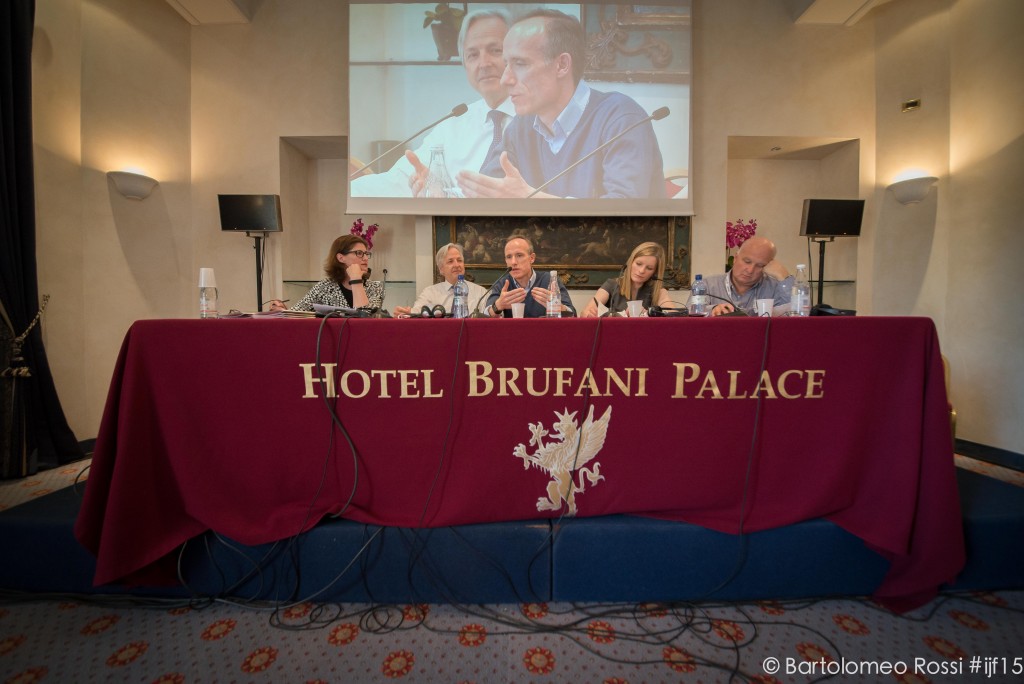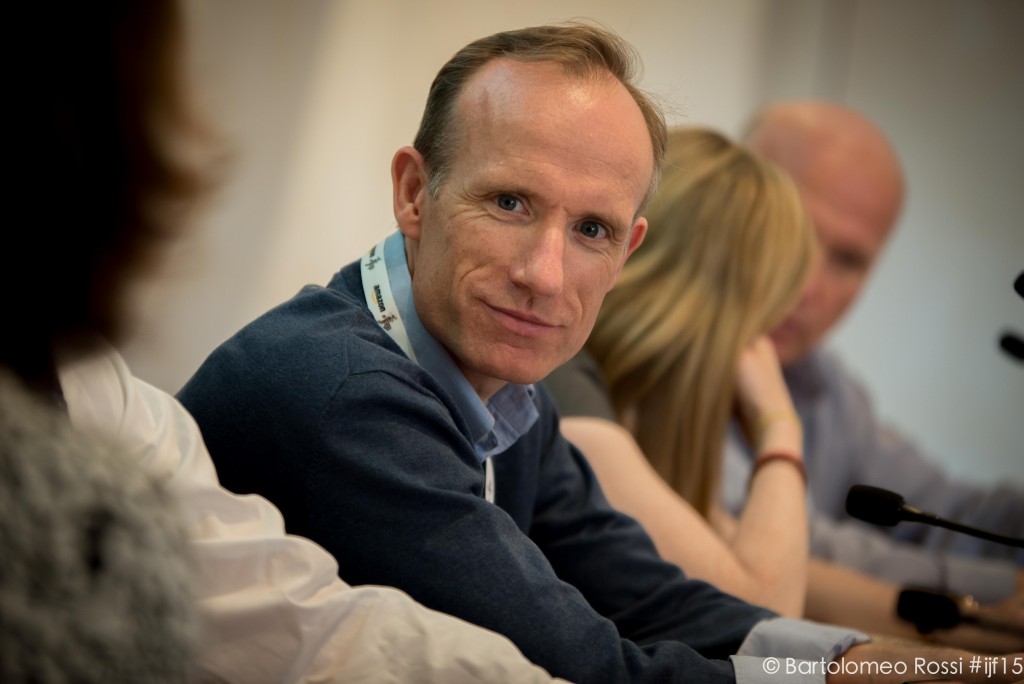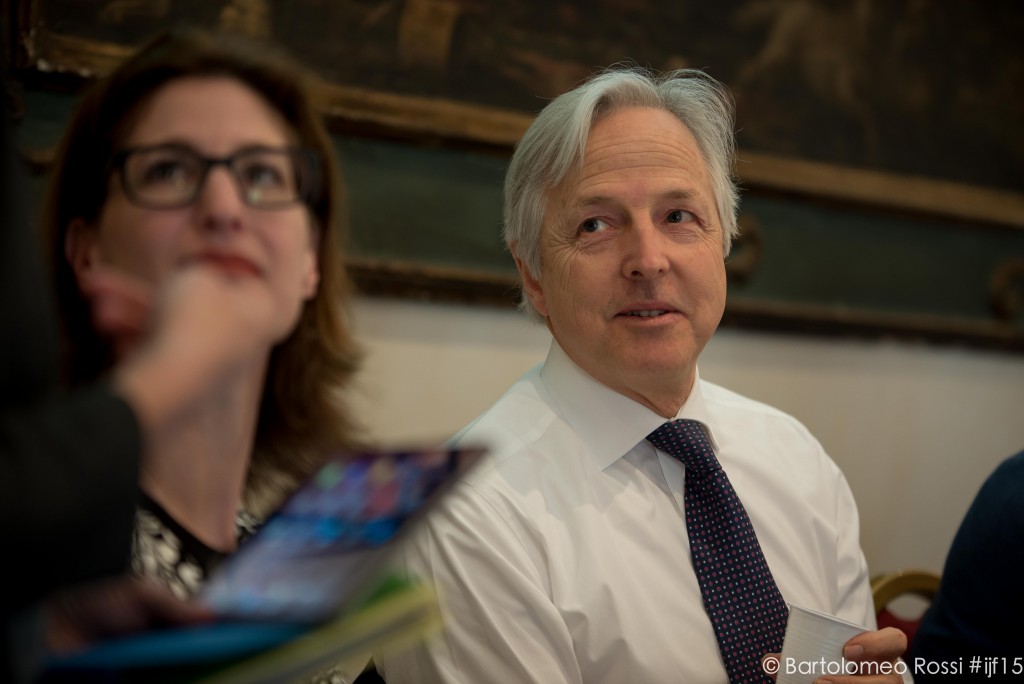Ukraine, Yemen, Iraq, Syria and South Sudan – these are just some of the ongoing conflicts that are often on the evening news. But what are the real problems journalists face when reporting on these conflicts, and how do they make editorial decisions? These were just some of the topics that were discussed during the panel discussion ‘Reporting from conflict’ at the International Journalism Festival.
Putting complicated foreign stories together can be challenging for journalists: for example, a 90-second report is often too short to explain the conflict fully. This applies to evening newscasts as they often don’t have much time to cover foreign news.
Safety of journalists: the main imperative for coverage
“There is a decision whether or not to cover a story and actually make it on time to be on air. The main thing we think about before we go to a conflict zone, is to think about how you are going to go there safely,” said Clark Bentson, who works for ABC News and has reported from 130 countries all over the world.
When discussing conflict reporting, he mentioned the recent example of Yemen, where journalists face security issues, but also practical problems including how to find food, how to transmit, etc.
But some stories, according to Bentson, are even more challenging as it is practically impossible to cover them. In cases such as ISIS, media professionals are relying more and more on social media, which poses the risk of receiving false content.
“We are not necessarily in Syria or Raqqa to be there and to decide whether to trust the content that is posted,” added Bentson.
But how does verification and souring material change the equation?
User generated content gives journalists insight and material that can truly add to the story, but there is a huge responsibilitiy for journalists who work in companies that are trying to verify content, explained Aine Kerr, Managing Editor of Storyful, a company that focuses on verifying the date, source and location of user-generated material.
She believes the role of professional journalism, which co-exists with citizen journalism, is to decide how this content will be used. “You need to give validation and verification, but also provide good analysis from experts.” “I am incredibly proud when I look around at newsrooms: this is the golden age of storytelling, it’s a very rich time for the sense of true professional journalism,” Kerr added.
What is the role of experts within the analysis?
Adding a comprehensive analysis to a news report is a requirement for an insightful news story. According to Stefan Wolff, international security lecturer from the University of Birmingham, the background knowledge an academic has might not fit into a 90-second report, but there certainly is a need for a journalist to have an understanding of the issue being discussed.
“As an academic, that is the kind of added value I can provide, as I have been dealing with these issues for 10-15 years. People like me know what is going on and can provide the background that can help you as journalists to understand whether how the story is being reported makes sense in a larger picture.”
Wolff also mentioned that sometimes academics have to be extremely cautious, because they don’t want to comment on issues that might compromise the position of people within actual negotiations, or the outcome of a negotiation itself.
“There is a difficulty for experts in terms of how far they can go in engagement with the media. In one way you need to be honest and truthful and preserve a degree of integrity, but that sometimes can also mean that you can’t talk about certain things. ” Academics need to be cautious: they risk giving someone a scoop that could have damaging consequences.
Diplomats and journalists between secrecy and desire to help
Collaboration between media and diplomats is inevitable, but there is a heightened tension on both sides in conflict zones. This according to Christopher Prentice, British Ambassador to Italy who was previously Ambassador in Iraq. He believes building trust between the two parties can be crucial.
During the panel discussion, he recalled his experience with journalists in Benghazi in the light of the Libyan revolution and the opening of British relations with the transitional National Council.
“I was in a hotel alongside all the international journalists, who could see me going backwards and forwards. I was having to be very selective in sharing content at an extremely delicate moment,” said Prentice. “There you had to decide which journalists you were prepared to entrust with any confidence,” Prentice added.
According to Bentson, who has a lot of experience with diplomats, there is nothing more frustrating than experts knowing relevant content without being able to share it. Nevertheless, he pointed out that journalists understand those issues.
“A lot of times there is a lot of fudging on 24-hour channels. They stand there and they fill time saying absolutely nothing,” Bentson added.
Freelancers and experts: their role in conflict reporting
But the nature of 24-hour news does not allow journalists to cover all the ongoing armed conflicts, as usually only conflicts that generate buzz are chosen. As big media companies are not willing to risk the safety of their journalists, this leads to lack of coverage, but also to the increasing number of freelancers who want to get their name in the industry.
As they often sell their work to companies like Storyful, Aine Kerr explains that companies need to check the location, date and every single clue that could help identify the credibility of the product, even if they have already worked with a particular journalist.
But tracking sources is as crucial as tracking the credibility of experts, who could often be misleading if they do not know the situation on the ground.
Building strong relationships with experts that are continuously researching a topic and talking honestly about their expertise is what Wolff believes should be the approach.
What Wolff gives as advice to journalists who want to stay balanced in their coverage is to not search for a truth that might not be there, but to try to understand perspectives without necessarily judging.


